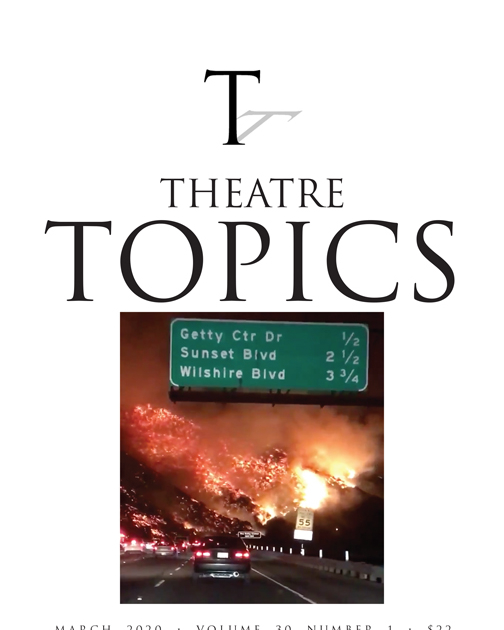Thinking through Theatre and Performance by Maaike Bleeker, et al. (review)
Theatre Topics, 30.1
 Opening section
Opening section
What can theatre help us to do? How can performance help us to think in new ways? What are the possibilities that theatre can open up? What can we learn from the performing body? How might theatre function as theory? Thinking Through Theatre and Performance, the first in an announced series of books called “Thinking Through Theatre,” offers twenty-one essays that provide answers, propositions, and provocations in response to these and other queries. The book is edited by Maaike Bleeker, Adrian Kear, Joe Kelleher, and Heike Roms, and it boasts an impressive array of international Anglophone scholars who address a range of questions that are important for any student of theatre and theatre-making practice.
At first glance, the queries that serve as title chapters in Thinking Through Theatre and Performance—for example, “Why Study Drama?” (chapter 1), “What Do Performances Do to Spectators?” (chapter 2), “How Can Performance Disrupt Institutional Spaces?” (chapter 17)—might seem as though they are introductory questions aimed at first-year undergraduates or students only just embarking on a study of theatre and performance. Each essay, however, interrogates its central question so deeply and with such rich results, that the questions feel as though they are asked anew. This is not an Introduction to Theatre textbook; these are inquiries intended for those of us who have been studying theatre already for some time. Better yet, the questions in this book ask us to look again at problems that seem basic to making performance, at assumptions we might have held for a long while, and at ideas we take for granted. The answers are inspiring, designed to push theatre artists in new directions and open up new ways of thinking for artists engaging with politics (chapter 15), accessibility (chapter 3), labor (chapter 11), and many other ideas. Thinking Through Theatre and Performance, then, is a book for upper-level undergraduates, graduate students—especially those in MFA programs—and theatre companies and artists as they make new work. The book operates at a sophisticated level of discourse, and the essays ask and attempt to answer difficult questions related to making and performing theatre.



Leave a Reply
Want to join the discussion?Feel free to contribute!